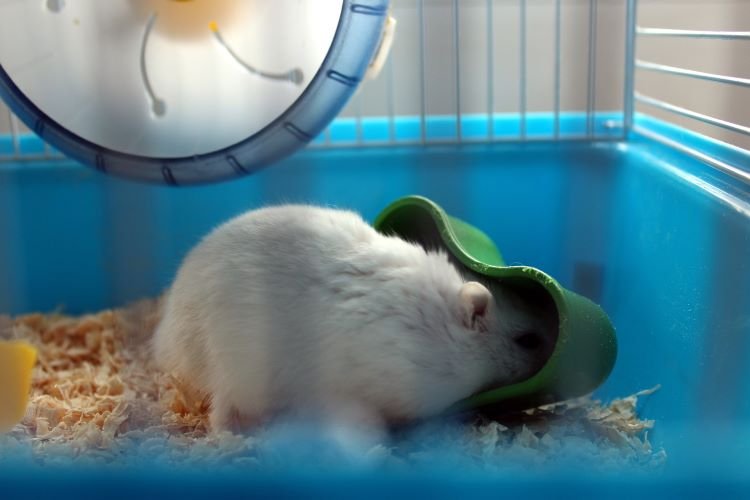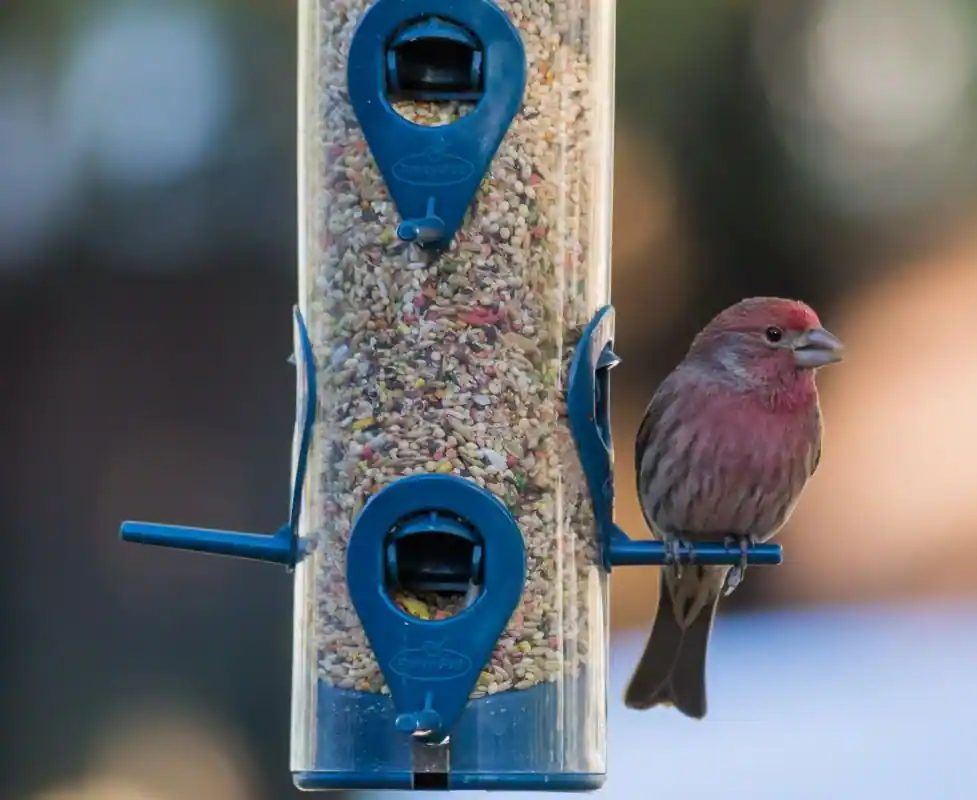Have you ever wondered if it’s safe for birds to eat hamster food? Many bird owners are curious whether they can supplement their feathered friends’ diet with hamster food, considering its nutritional content and affordability.
In this article, we will explore the potential risks and benefits of feeding hamster food to birds, providing you with the information you need to make an informed decision for your avian companion.
What is Hamster Food?

Hamster food is specifically formulated to meet the nutritional needs of hamsters, providing them with the necessary vitamins, minerals, and other essential nutrients to support their overall health and well-being. It is a combination of ingredients that are carefully selected to ensure a balanced diet for these small furry creatures.
Ingredients in Hamster Food
Hamster food typically consists of a variety of seeds, grains, and pellets. These ingredients may include sunflower seeds, pumpkin seeds, oats, barley, corn, soybeans, and alfalfa pellets. Some hamster foods also contain dried fruits and vegetables to provide additional nutrients and flavor.
Nutritional Value of Hamster Food
Hamster food is designed to provide a complete and balanced diet for hamsters. It contains a good balance of carbohydrates, proteins, fats, vitamins, and minerals, which are essential for the overall health and growth of these animals. The specific nutritional requirements may vary depending on the species and age of the hamster.
Food Preferences of Birds

Birds have unique dietary preferences and requirements that are different from those of hamsters. While hamsters are predominantly herbivorous, birds have a more varied diet that may include seeds, grains, fruits, vegetables, and even insects.
Seeds and Grains
Seeds and grains are a staple in the diet of many bird species. They provide a good source of energy and essential nutrients, including carbohydrates, proteins, and certain vitamins and minerals. Birdseed mixes that include a variety of seeds, such as sunflower seeds, millet, and safflower seeds, are commonly offered to birds.
Fruits and Vegetables
Fresh fruits and vegetables are also important components of a bird’s diet. They provide essential vitamins, minerals, and antioxidants that help support their overall health. Some popular fruits and vegetables to offer birds include apples, grapes, bananas, carrots, peas, and leafy greens.
Insects and Protein
Insects and other sources of protein are an important part of the diet of many bird species, especially during nesting season when they need extra energy. Birds may consume insects, worms, and even small animals like mice or fish to meet their protein needs.
Can Birds Safely Consume Hamster Food?

While hamster food is formulated to meet the needs of hamsters, it does not necessarily mean that it is suitable for birds. There are several factors to consider before giving hamster food to birds.
Potential Risks
One of the main concerns with feeding hamster food to birds is the potential risk of nutrient imbalances. Hamster food may not provide the specific nutrients that birds require, leading to deficiencies or excesses that can cause health problems in the long run. Additionally, some ingredients in hamster food may be difficult for birds to digest, leading to digestive issues and discomfort.
Considerations
If you are considering offering hamster food to birds, it is important to consult with a veterinarian who specializes in avian nutrition. They can provide guidance based on the specific needs of your bird species and help you determine if hamster food is a suitable addition to their diet. Always prioritize the health and well-being of your feathered friends.
Digestive System Differences
Both Birds and hamsters have different digestive systems, which contribute to their distinct dietary requirements and preferences.
Birds’ Digestive System
Birds have a unique digestive system that is well-adapted to their natural diet. Their digestive tract consists of several parts, including the crop, gizzard, and intestines. Birds have a relatively fast metabolism, allowing them to quickly process food and extract necessary nutrients.
Hamsters’ Digestive System
On the other hand, hamsters have a simpler digestive system compared to birds. They have a relatively shorter digestive tract, which means their food passes through their system at a slower pace. Hamsters are hindgut fermenters, meaning that they rely on bacteria in their cecum to break down hard-to-digest fibers.
Health Effects of Hamster Food on Birds

Feeding hamster food to birds can have both positive and negative health effects, depending on various factors.
Possible Benefits
In some cases, the nutritional composition of hamster food may provide birds with certain nutrients that they require. However, it is important to note that this should be done under the guidance of a veterinarian and in conjunction with a balanced diet consisting primarily of bird-specific foods.
Potential Risks
The main concern with feeding hamster food to birds lies in the potential nutrient imbalances and digestive issues that may arise. Birds may not be able to properly digest certain ingredients in hamster food, leading to digestive discomfort and nutrient deficiencies or excesses. Furthermore, some seeds or pellets may be high in fat or contain added sugar, which can be detrimental to the health of birds in the long term.
Types of Hamster Food to Avoid
If you are considering offering hamster food to birds, it is important to know which types of hamster food to avoid due to their potential negative impact on avian health.
High-Fat Seeds
Some hamster foods contain high-fat seeds, such as sunflower seeds, which may not be suitable for birds. While birds require some fat in their diet, excessive consumption of high-fat seeds can lead to obesity and other health issues.
Added Sugar
Hamster foods that contain added sugar should also be avoided when feeding birds. Birds do not have the same dietary requirements for sugar as hamsters, and excessive sugar consumption can lead to obesity, diabetes, and other health problems.
Processed Foods
Processed hamster foods that contain artificial colors, preservatives, and flavorings should be avoided when feeding birds. These additives may not be well-tolerated by birds and can potentially have negative health effects.
Safe Alternatives for Birds

If you want to offer your birds a varied diet, there are several safe alternatives to hamster food that you can consider.
Seeds and Nuts
Offering a variety of seeds and nuts is a great way to provide birds with essential nutrients and keep them engaged during feeding. Opt for birdseed mixes that are specifically formulated for your bird species, as they will provide a well-balanced combination of seeds that meets their dietary requirements.
Fresh Fruits and Vegetables
Including fresh fruits and vegetables in your bird’s diet is an excellent way to provide them with additional vitamins, minerals, and antioxidants. Make sure to offer a variety of safe fruits and vegetables that are suitable for your bird species.
Commercial Bird Food
Commercially available bird food, such as pellets and crumbles, is specifically formulated to provide a well-balanced diet for birds. These foods are designed to meet their specific nutritional needs and often contain a blend of seeds, grains, and other essential nutrients.
Introducing Hamster Food to Birds

If you have consulted with a veterinarian and received guidance on introducing hamster food to birds, it is important to follow a gradual introduction process.
Gradual Introduction
Start by offering a small amount of hamster food alongside your bird’s regular diet. Monitor your bird closely for any signs of digestive upset or adverse reactions. If your bird tolerates the hamster food well, gradually increase the amount over time while still maintaining a balanced diet.
Observing Bird’s Response
Keep a close eye on your bird’s overall health and behavior when introducing hamster food. Watch for any changes in appetite, droppings, energy levels, or appearance. If you notice any negative effects or concerns, discontinue offering hamster food and consult with a veterinarian.
Potential Behavioral Effects
Introducing hamster food to birds can potentially have behavioral effects due to changes in their feeding patterns and natural foraging behavior.
Overeating and Obesity
Hamster food, especially if high in fat or sugar, can be highly palatable to birds. This can lead to overeating and weight gain, increasing the risk of obesity and associated health problems. Always monitor your bird’s portion sizes and overall calorie intake to maintain a healthy weight.
Changes in Natural Foraging Behavior
Offering hamster food to birds can alter their natural foraging behavior. Since hamster food is typically provided in bowls or feeders, birds may lose the opportunity to search and forage for food, which is an important source of mental and physical stimulation for them. Consider providing opportunities for natural foraging behavior to keep your bird mentally engaged.
Conclusion
Feeding hamster food to birds should be approached with caution, taking into consideration the specific nutritional requirements and digestive differences between the two species. While there may be potential benefits in certain cases, it is important to consult with a veterinarian specializing in avian nutrition before introducing hamster food to birds.
Final Thoughts
Remember, the health and well-being of your feathered friend should always be your top priority. Offering a balanced and varied diet that is suitable for your bird species, along with regular veterinary check-ups, will help ensure that they receive the nutrition they need to thrive.
Consulting a Vet
If you have any concerns or questions about the diet and nutrition of your bird, always consult with a veterinarian who specializes in avian care. They will be able to provide you with personalized guidance and answer any specific questions you may have.



